When we first decided to try out car camping, our very first (very drawn out) decision was to choose which camper vehicle was best for us. There was an array of things to consider here. And each one extremely personal to what we wanted. We did a ton of research, joined forums and asked lots of questions. So we thought we could use our experience in this area to help you get started in overlanding. We’ll outline all the categories we considered to help us make our decision on what type of camper vehicle was best for us.
Of course, the camper life is not for everybody. But there is a distinct romantic vibe to car camping. We see it and so do many others. Look through any social media platform and you will see a myriad of millennials adopting the ‘#vanlife‘.
Maybe it’s the charm of self-sufficiency and living on the road that calls so many to its world. Or perhaps it is less dramatic than that. Rising cost of living, huge student debt, low graduate employment and a high unemployment rate may be forcing us into smaller spaces.
Nonetheless, there are great benefits to adopting camper travel and road tripping around this beautiful planet of ours.
Let’s explore! 🌎
Are you new to car camping? Want to learn more about how to get started, what to pack and how to get around? Check out our other overlanding posts:
- Essential Car Camping Gear You NEED When Overlanding
- 15 Green Tips on Responsible Overland Travel
- Why You Should Consider Car Camping
- 10 of the Best Budget Sleeping Bags
- Your Ultimate Camping Packing List
So if you think this world may be right for you, the first step is to decide what camper vehicle to buy. There are almost limitless options for what you can actually live in and drive in. It can actually become quite overwhelming in the beginning.
Each type of camper vehicle offers something different and there is no right answer for everyone.
The first and most distinguishing question is: What are you using your camper vehicle for? Are you just using it periodically for weekend trips? You would likely benefit from a converted bus or RV. Are you going to be travelling the world with it? You may want to consider something smaller like a van or high-top van.
What Kind of Camper Vehicle is Right for You?
Types of Camper Vehicles
There is a whole slew of camper vehicle types that you can choose. You could literally convert any vehicle imaginable into a camper. This world tends to attract more eccentric people, which can translate into very eccentric camper vehicles. But to keep this post succinct, we’ll split campers up into 5 different types:
#1 Camper Van
This could be anything from a car to a mini-van, SUV, cargo van, or extended van.
#2 High-top Van
A van you can stand up in. Something with a built-in high top or pop-up top. For example, a self-contained class B RV, Sprinter, or Ford Transit.
#3 Short Bus
A shuttle bus, passenger bus, or ambulance.
#4 Long Bus
A long bus or school bus.
#5 RV
A Class A/B/C RV, 5th wheel, motor home, or travel trailer.
Stealth
This seems to be the most talked about subject in the camper community.
Having a ‘stealth‘ vehicle means that no one can tell you are living in it. There are advantages to this. You can get away with parking in more places with a stealth vehicle. You don’t need to seek out established campgrounds and you can park in parking lots, at beaches, in busy city areas and at rest stations more easily. This gives you more flexibility and a way to save lots of cash.
Also, in theory, you have less people interested in your vehicle. If a vehicle appears to have someone living in it, there may be more reason to break in. You can also minimize the attention of the authorities. Sometimes, you may need to park somewhere that is slightly less than ‘legal’, a stealthy vehicle will help to keep cops and security guards at bay.
If you are concerned about stealth, than a regular van or a high top van will be your best option. However, if you aren’t travelling around too much and plan to stay in established campgrounds, then a bus or RV will do you just fine.
Gas Mileage
If you are using your camper to travel around a lot then gas mileage is going to be one of your top concerns. We all know that an RV can cost a fortune just to get to your destination.
If mileage is important to you, you will do much better with a smaller vehicle. Before you purchase your vehicle, check it out on Fuelly.com to see how others rate its mileage.
Here’s a rough list of what mileage you can expect with each type of vehicle. Keep in mind, these numbers will differ depending on the age of the engine, whether it’s diesel, how much weight you are carrying etc.:
Van: 15 – 25 mpg
High-top Van: 15 – 20 mpg
Short Bus: 10 – 15 mpg
Long Bus: 4 – 10 mpg
RV: 8 – 15 mpg
Maintenance
If you are traveling a lot, you will be spending money on maintaining your vehicle. Any vehicle is going to need the typical maintenance (oil changes, tire changes etc), and perhaps the occasional bigger fix (engine or transmission work).
In general, vehicle maintenance will be cheaper on a van compared to a bus or RV. It will also be easier to find parts for a van compared to a bus or RV (this is especially important if you are travelling in a foreign country). If you have an RV, another thing to consider is the maintenance on extra features like plumbing, gas system, appliances and TV.
Breakdowns
If you are unfortunate enough to break down on the side of the road, it will be much easier to get towed in a van rather than a bus or RV.
Space and Standing Room
Choosing the right camper means knowing how much space you will need.
A big reason people shy away from a regular height van is because they are unable to stand inside of it. This might be okay for a weekend trip but it may get old if you are living in it full-time. A high-top van will give you much more live-able space and allow you to move around the camper much easier.
If you are traveling solo, you probably won’t need much space and could live out of a van no problem. While a couple travelling together or if you have pets, you will probably want a high-top van or a short bus. And if you are a family you will probably be much happier in a long bus or RV.
What are your must-haves? If all you need is a bed then you’ll be fine in a mini-van or cargo van. Perhaps having a kitchen is a priority, then you will need at least an extended cargo van. If you want a shower you could always get away with an outdoor shower. But for a more private bathroom experience you will need to convert a bus or get an RV.
If you think the overlanding camper life is for you, there are some essential items you will need to help you get off the grid, and to stay safe, comfortable and prepared. Here is our list of The Top 5 Pieces of Car Camping Gear to help you get started on your journey:
- Goal Zero Yeti 400 Portable Power Station – The ultimate, all-in-one portable power station.
- HQST Solar Panel – Find a solar panel that can sit flat on the roof.
- Mr. Heater Buddy – A safe and efficient way to keep you warm inside your camper vehicle.
- Fan-Tastic Roof Vent – Keeping moisture out of your camper keeps the interior healthy and keeps condensation off your windows (helping to keep you stealth).
- Anker USB Car Charger – To charge your phone & laptop on the go. An essential piece of gear on the road.
Ease of Driving
It’s pretty simple, the larger the vehicle, the more difficult it is to drive. If you have a smaller vehicle you will be able to drive faster and get to more remote areas like into forests, deserts and on mountains. A smaller vehicle will also be easier to drive in big cities.
Another thing to consider is the height of your vehicle. The height of a bus or RV may prevent you from driving under certain bridges or getting into underground parking lots. If your plan is to have your vehicle parked most of the time, size doesn’t much matter. But if you are planning to drive cross country, you’ll find it much more effortless with a van.
Ease of Parking
With a van you will be able to park in any spot, urban or rural. If you have a large bus or RV you will run into problems trying to find a parking spot which can become frustrating and limit you on where you can go.
Start up Cost of Your Camper Vehicle
If you have a small budget for purchasing your vehicle, you’re pretty limited with your choices. Of course, the cheapest way to get yourself a camper would be to convert a small van. The larger you go, the more expensive. I will say that you can find a used bus for a pretty reasonable price. I have seen older short and long buses online for $5,000 – $10,000. RVs, no matter what the size, tend to be quite pricey.
Are you looking for other ways to travel the world on a budget? Check out our budget series to find cheap and affordable travel methods:
- ‘How to Find Budget Accommodation and Lodging Anywhere in the World’
- ‘Things to do for Free While Traveling’
- ‘How to Maintain Your Food Budget While Traveling’
- ‘How to Travel the World for Free’
Converting the Vehicle Into a Camper
Converting a regular vehicle into a camper requires you to have the money, the time and the skill. For this reason alone, many people choose to keep it simple and purchase an RV. If you are willing to do a conversion, the cheapest and simplest way will be by adding a bed and some storage to a small van. Converting an extended van and high-top van will cost you more since you will likely be adding a kitchen and maybe a makeshift bathroom. A bus supplies you with a huge amount of space but will demand the most money and time to convert.
Customization
For a true custom vehicle that is unique to you and your needs, your best bet is a high-top van or a bus. You will be given enough space to design whatever you can imagine.
Cool Factor
If you want to turn people’s heads, start up conversation or get noticed on social media, go unique. Repurposing a vehicle like an ambulance or a bus into a camper will get you loads of attention. The sky is the limit with your choice of vehicle. This is where you can let your freak flag fly!
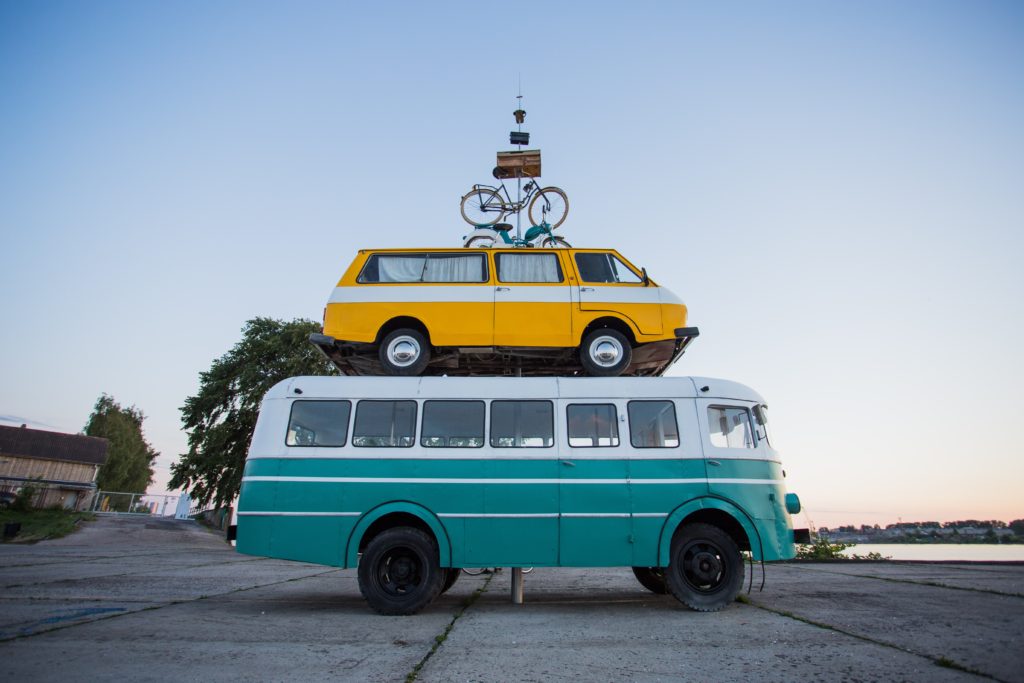
Licensing and Insurance
For the most part, you can drive these vehicles with a regular license. To drive a bus might be a little tricky and the rules change depending on where you live. In general, you can drive a bus with a regular license as long as you have the bus registered as a camper, have no more than the allowed seating, have certain warning lights and stop arms taken off and you may have to paint it a different colour than “school bus yellow”. For most RVs you are okay with a regular license. However, in some parts of Canada you will need a ‘D’ license to drive an RV if it is over 24,250 lbs, and in the USA you will need a CDL for anything over 26,000 lbs (depending on your state). A quick Google search will explain the laws in your hometown.
The price of insurance for a camper van will be comparable to a regular car. Insurance for a bus or an RV will be more expensive. Not only that but some companies may not even take you on as a customer. Check with your insurance company first before purchasing your camper.
Storage
If you do not have a place to store your camper, a bus or an RV is definitely out of the picture. Either that or it will cost you big time to store your camper in the off-season. A camper van will be much cheaper and easier to store. Or better yet, your camper van can double as your daily driver so you don’t have to store it at all.
Can you think of any other important topics to consider before purchasing your camper vehicle? Comment below!
Do you love this post? Share it on Pinterest:
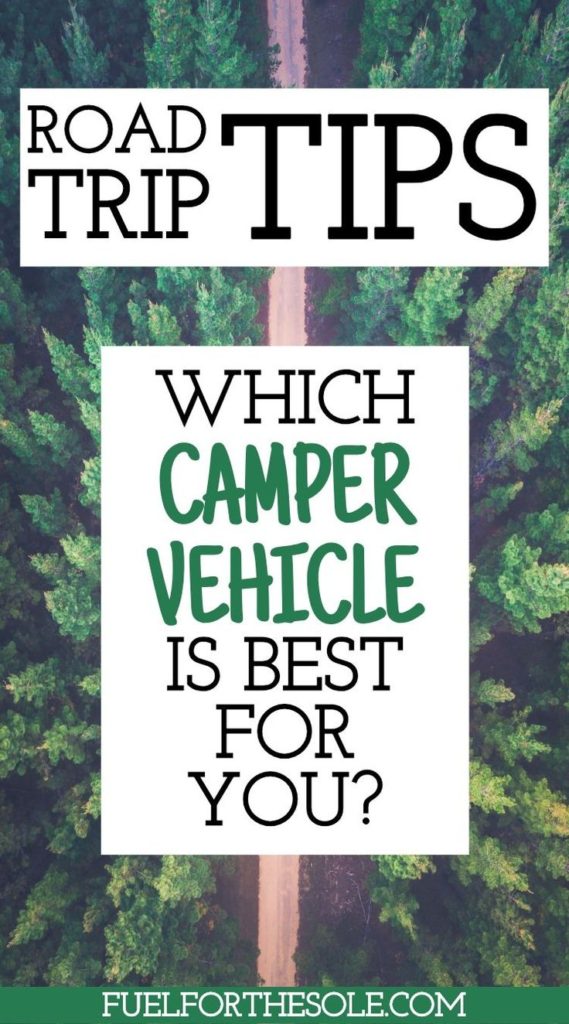
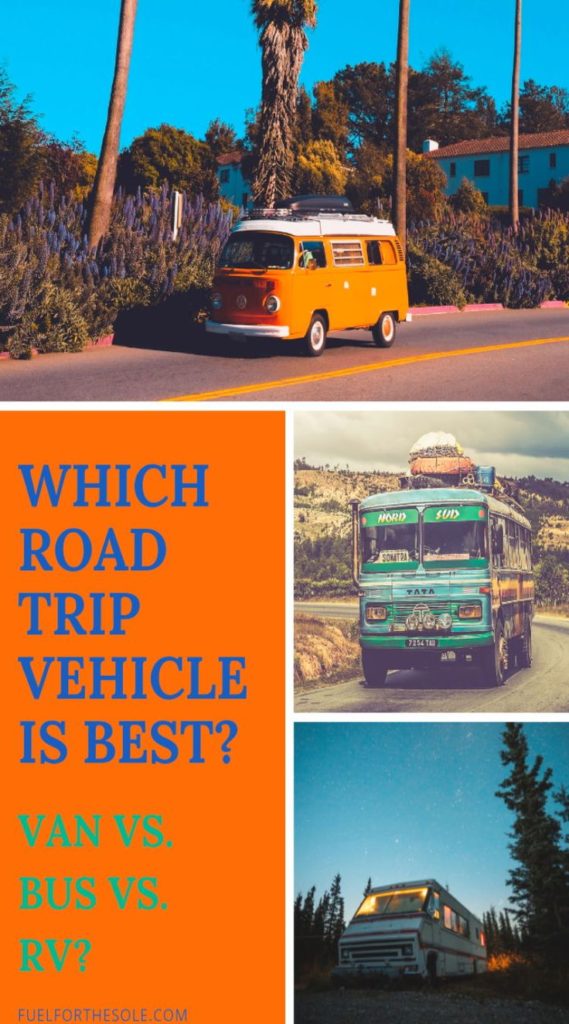
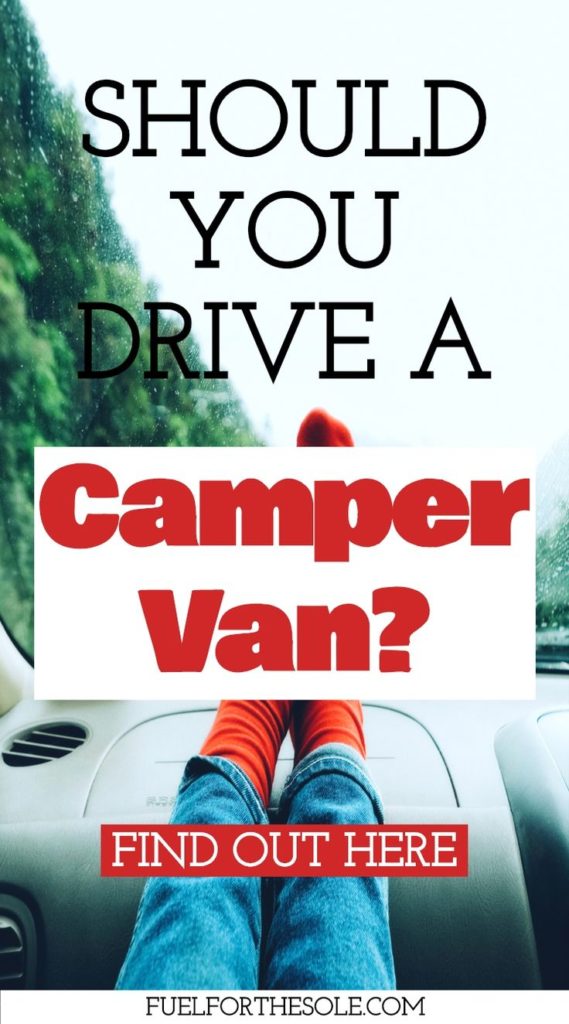
*This post may contain affiliate links that help to keep this blog running. Read our disclosure for more information.

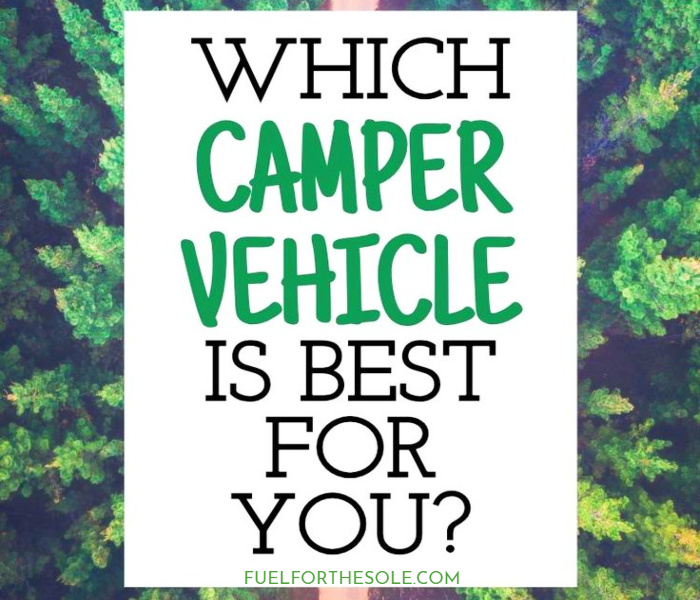
23 comments
monopoly slots free https://www-slotmachines.com/
vegas grand slots https://411slotmachine.com/
hot shot slots https://download-slot-machines.com/
my konami slots https://slot-machine-sale.com/
cash me out slots youtube https://slotmachinesworld.com/
free slots to play https://pennyslotmachines.org/
fre slots https://candylandslotmachine.com/
free christmas slots https://freeonlneslotmachine.com/
caesar casino slots game https://2-free-slots.com/
black gay dating https://speedgaydate.com/
gay online chat https://gay-buddies.com/
chat cam gay random https://gaytgpost.com/
one on one gay sex chat on camera for masterbation https://bjsgaychatroom.info/
1sportsman
[…] ‘Which Camper Vehicle is Right for You?’ […]
[…] ‘Which Camper Vehicle is Right for You?’ […]
[…] ‘Which Camper Vehicle is Best for You?’ […]
[…] ‘Which Camper Vehicle is Best for You?’ […]
[…] Which Camper Vehicle is Best for You: A Van, Bus or RV? […]
[…] Which Camper Vehicle is Best for You: A Van, Bus or RV? […]
Yes! We have had a little 12-foot travel trailer for several years now. Not really weekend campers, we usually take it on long trips out to the western US. This past summer, for example, we spent three weeks in Colorado, Utah, Nevada, Death Valley, Arizona, and New Mexico. Other times, we park it for a week or so at a favorite spot in Colorado and just hang there or do day trips, climb peaks, etc. For the latter kind of trip, here’s one thing to consider. If you are going somewhere and staying for several days or a week with a driveable RV, you will need to either bring some other form of transportation along with you (hauling mopeds, motorcycles, or an additional car!!) or you will need to pretty much plan on staying where you are hooked up, unless you want to unhook from the services every time you go into town, for example, which I would find a royal pain. By towing a travel trailer, we can hook up to the water, electricity, etc., AND unhook the car from the trailer. Then we can drive into town, drive to the base of a climb, go to a cool city nearby, take a scenic drive, etc., all without having the RV with us.
I love that you guys are into overlanding and camping too! Your summer trip sounds a lot like ours coming up early next year. We can’t wait. We’re happy to have a camper van so we don’t have to worry about hooking up to services and can easily drive everywhere. We’d love to purchase a travel trailer like yours in the future.
[…] you are struggling on what type of vehicle to buy for your overlanding road trip, read our post ‘Overland Travel: Van, bus or RV?’ to pick the perfect camper for […]